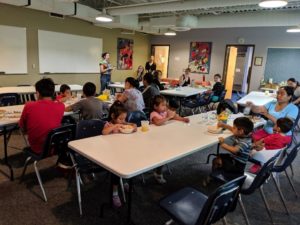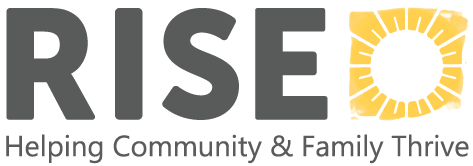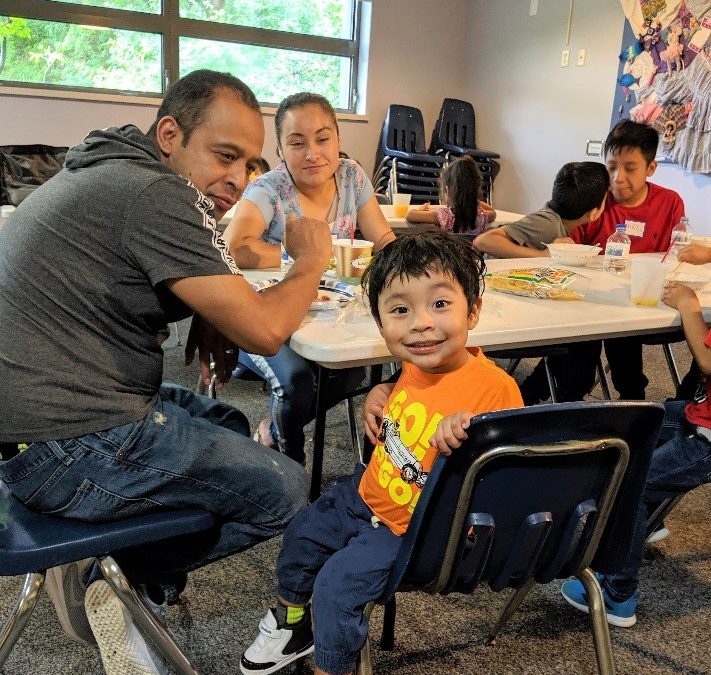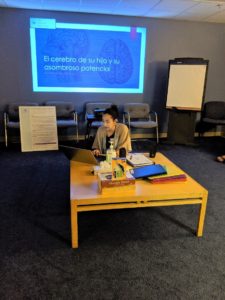Here at RISE, we’re constantly working to develop events and educational series to help our participants in the community thrive. In June to July of this year, our Welcome Baby & Beyond program developed a six week series called Importa lo Que Usted Hace, or What You Do Matters. This series was hosted at our Fordem Location in the north side of Madison, and was facilitated completely in the Spanish for our Spanish speaking families. The facilitator, our very own Bilingual Family Support Specialist and home visitor, Daniela Robledo, writes her experience of developing this series and why it was important. Take it away, Daniela!
As a Bilingual Family Support Specialist and a home visitor in the Welcome Baby & Beyond program, I have learned that the quality of the parent-child relationship is influenced by the amount of social support a parent or family receives, as well as the general parent knowledge of the child’s development in the early years of life. I wondered about the possible outcomes for the Latin American families in our program, if given the opportunity to meet and connect during a 6-week parent group delivered in their native language; this would be our first ever parent group in Spanish.
Importa lo Que Usted Hace (What You Do Matters) was adapted to both help families express their parenting experience with others and to understand their children through education and support. As the name of the parent group implies, parents have a large impact on the development of their child(ren). I hoped for parents to find deeper meaning into their children’s learning capacity and to augment their confidence as parents through the topics of attachment, discipline, learning through play, emotions and self-regulation.
 Figure 2. Icebreaker during mealtime with families
Figure 2. Icebreaker during mealtime with families
At the start of every reunion each week, we offered an authentic Oaxacan meal from a local restaurant, which families would enjoy together in our offices’ community room. During our first group, I noticed how families would sit away from each other in isolation during dinner, and as the weeks went by, I saw a shift in comfort and familiarity between the six families that regularly attended. I would bring “ice-breakers” that would explore each parent’s history of being parented, as well as ask parents about their experiences with their children. This would bring up many conversations about the similarities or differences in beliefs and traditions practiced by each family. It also brought feelings and thoughts around their current state of being a mother or a father and what they felt was expected of them.
Figure 3. Families enjoying a traditional Oaxacan meal
Witnessing these interactions and exchanging of ideas as a group facilitator was interesting. At times, I felt uncertain of the outcome. Would parents leave offended when talking about differences? Would parents not feel understood? To ensure the safety and comfort of everyone, I made sure to create space in our group session to brainstorm and decide on some ‘group agreements.’ I was most impressed when families vocalized that they did not want to be judged by their peers, knowing that this is something they encounter frequently in the outside world as parents. I felt we had built a strong foundation of trust and was grateful for everyone who contributed in respecting these shared values during our time together.
Throughout those 6 weeks, I learned about the shared fear that parents had about leaving their children in the care of others. For some, it had been the first time they were away from their child(ren). This was an opportunity for them to see how their children responded to separations lasting for up to an hour. My colleagues, who generously volunteered their time in caring for them, shared that the children were very happy playing outside on the playground. I remember some children had a hard time saying good-bye to the fun. So, in our group, I explored what that was like for the parents and I could see that the common consumption of thoughts of their children and the sharing out of these feelings had created a pool of validation for all.
Thank you to Daniela for facilitating and the families who participated in our six week series! We have to give credit to the Rotary Club of Madison for providing a grant to make it all possible. We also have to thank our sponsors, Kwik Trip and Willy Street Co-op for providing in-kind donations! Your support of RISE helps us provide resources to our participants that help them thrive, we couldn’t do alone! Thank you!
To learn more about our Welcome Baby & Beyond Program, check out information on our website at: https://risewisconsin.org/programs/welcome-baby-beyond/





